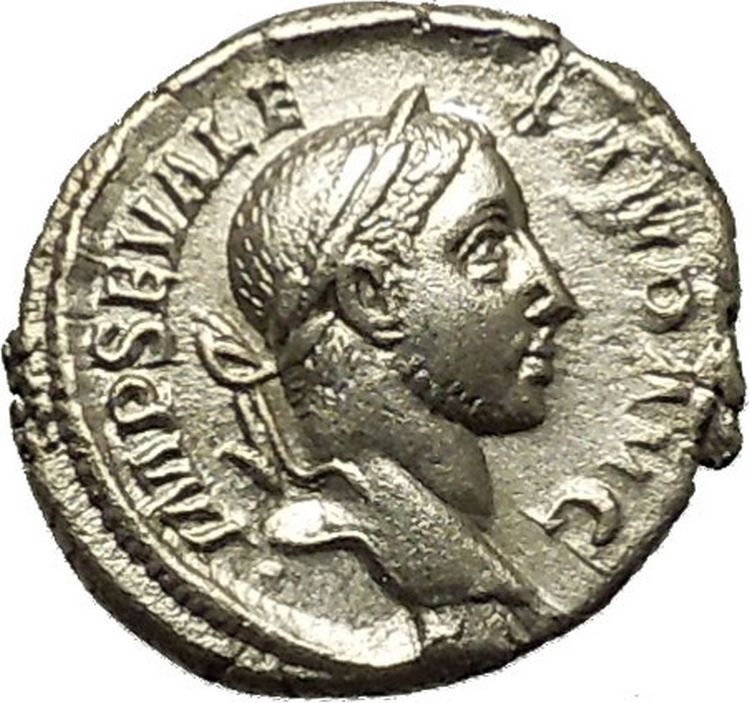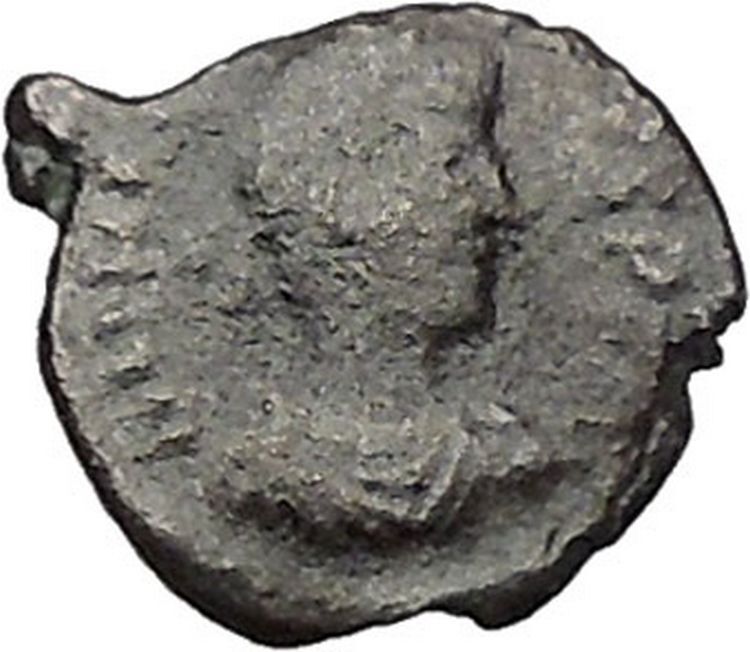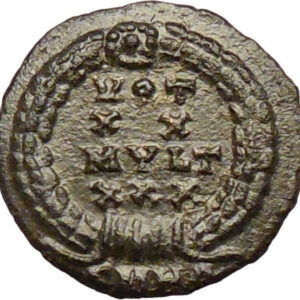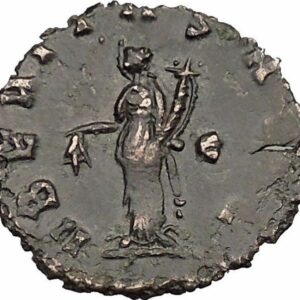|
Faustina I ‘Senior’ – Roman Empress, wife of Antoninus Pius
DIVA FAUSTINA ISSUE
Bronze Sestertius 33mm (24.76 grams) Rome mint, struck under Antoninus Pius circa 146-161 A.D.
Reference: BMC 1509. Cohen 79. RIC 1116.
DIVA FAVSTINA Draped bust of Diva Faustina Senior to right.
AVGVSTA / S – C Ceres standing front, head to left, holding grain ears in her right hand and torch in her left.
You are bidding on the exact item pictured, provided with a Certificate of Authenticity and Lifetime Guarantee of Authenticity.
In ancient Roman religion, Ceres was a goddess of agriculture, grain crops, fertility and motherly relationships. Her cult took many forms. She was the central deity in Rome’s so-called plebeian or Aventine Triad, and was paired with her daughter Proserpina in what Romans described as “the Greek rites of Ceres”. She played an essential role in Roman marriage and in funeral rites. Her seven-day April festival of Cerealia included the popular Ludi Ceriales (Ceres’ games). She was honoured in the May lustration of fields at the Ambarvalia festival, and at harvest-time. She is the only one of Rome’s many agricultural deities to be listed among the Di Consentes, Rome’s equivalent to the Twelve Olympians of Greek mythology. Her functions and cults were held equivalent to those of the Greek goddess Demeter, whose mythology she came to share.
Faustina I ‘Senior’ – Augusta: 138-140/141 A.D.
| Wife of Antoninus Pius | Mother of Faustina II ‘Junior’ and Galerius Antoninus | Aunt of Marcus Aurelius | Grandmother of Commodus, Annius Verus, Lucilla and Aurelius Antoninus |
 Annia Galeria Faustina, more familiarly referred to as Faustina the Elder (Latin: Faustina Major; born September 21 about 100, died October or November 140), was a Roman Empress and wife of Roman Emperor Antoninus Pius. Annia Galeria Faustina, more familiarly referred to as Faustina the Elder (Latin: Faustina Major; born September 21 about 100, died October or November 140), was a Roman Empress and wife of Roman Emperor Antoninus Pius.
Faustina was the only known daughter of consul and prefect Marcus Annius Verus and Rupilia Faustina. Her brothers were consul Marcus Annius Libo and praetor Marcus Annius Verus. Her maternal aunts perhaps were Roman Empress Vibia Sabina, Matidia Minor. Her paternal grandfather had the same name as her father and her maternal grandparents possibly were Salonina Matidia (niece of Roman Emperor Trajan) and suffect consul Lucius Scribonius Libo Rupilius Frugi Bonus. Faustina was born and raised in Rome.
As a private citizen, she married Antoninus Pius between 110 and 115. Faustina and Antoninus had a very happy marriage. Faustina bore Antoninus four children, two sons and two daughters. They were:
-
Marcus Aurelius Fulvius Antoninus (died before 138); his sepulchral inscription has been found at the Mausoleum of Hadrian in Rome.
-
Marcus Galerius Aurelius Antoninus (died before 138); his sepulchral inscription has been found at the Mausoleum of Hadrian in Rome. His name appears on a Greek Imperial coin.
-
Aurelia Fadilla (died in 135); she married Aelius Lamia Silvanus or Syllanus. She appears to have had no children with her husband and her sepulchral inscription has been found in Italy.
-
Annia Galeria Faustina Minor or Faustina the Younger (between 125-130-175), a future Roman Empress; she married her maternal cousin, future Roman Emperor Marcus Aurelius. She was the only child who survived to adulthood.
On July 10, 138, her uncle emperor Hadrian had died and her husband became the new emperor. Antoninus was Hadrian’s adopted son and heir. Faustina became Roman Empress and the senate accorded her the title of Augusta. Faustina as an empress was well respected and this beautiful woman was renowned for her wisdom. The Augustan History impugned her character, criticizing her as having “excessive frankness” and “levity”. However, this doesn’t appear to be the case with her character. Throughout her life, Faustina as a private citizen and an empress was involved in assisting with charities, assisting the poor and sponsoring and assisting in the education of Roman children, particularly of Roman girls.
She can be viewed as one of the most moral, stable and respected empresses in the history of the Roman Empire. When Faustina died, Antoninus was in complete mourning for Faustina.
Antoninus did the following in memory of his loving wife:
-
Deified her as a goddess (her apotheosis was portrayed on an honorary column)
-
Had a temple built in the Roman Forum in her name, with priestesses in the temple.
-
Had various coins with her portrait struck in her honor. These coins were inscribed DIVA FAVSTINA (“Divine Faustina”) and were elaborately decorated.
-
Founded a charity called Puellae Faustinianae or Girls of Faustina, which assisted orphaned girls.
-
Created a new alimenta (see Grain supply to the city of Rome).
In 2008, archaeologists digging at the ancient site of Sagalassos in Turkey discovered a colossal marble head which is believed to be that of Faustina.
 Antoninus Pius – 138-161 A.D. Antoninus Pius – 138-161 A.D.
Caesar: 138 A.D. (under Hadrian)
Augustus: 138-161 A.D.
| Adopted son and successor of Hadrian | Husband of Faustina Senior | Father of Faustina Junior and Galerius Antoninus | Grandfather of Commodus, Annius Verus, Lucilla and Aurelius Antoninus | Adoptive father of Marcus Aurelius and Lucius Verus |
Titus Aurelius Fulvus Boionius Arrius Antoninus (19 September 86 – 7 March 161), generally known in English as Antoninus Pius was Roman emperor from 138 to 161. He was the fourth of the Five Good Emperors and a member of the Aurelii. He did not possess the sobriquet “Pius” until after his accession to the throne. Almost certainly, he earned the name “Pius” because he compelled the Senate to deify his adoptive father Hadrian; the Historia Augusta, however, suggests that he may have earned the name by saving senators sentenced to death by Hadrian in his later years.
He was the son and only child of Titus Aurelius Fulvus, consul in 89 whose family came from Nemausus (modern Nîmes) and was born near Lanuvium and his mother was Arria Fadilla. Antoninus’ father and paternal grandfather died when he was young and he was raised by Gnaeus Arrius Antoninus, his maternal grandfather, a man of integrity and culture and a friend of Pliny the Younger. His mother married to Publius Julius Lupus (a man of consular rank), Suffect Consul in 98, and bore him a daughter called Julia Fadilla.
As a private citizen between 110 and 115, he married Annia Galeria Faustina the Elder. They had a very happy marriage. She was the daughter of consul Marcus Annius Verus and Rupilia Faustina (a half-sister to Roman Empress Vibia Sabina). Faustina was a beautiful woman, renowned for her wisdom. She spent her whole life caring for the poor and assisting the most disadvantaged Romans.
Having filled with more than usual success the offices of quaestor and praetor, he obtained the consulship in 120; he was next appointed by the Emperor Hadrian as one of the four proconsuls to administer Italia, then greatly increased his reputation by his conduct as proconsul of Asia. He acquired much favor with the Emperor Hadrian, who adopted him as his son and successor on 25 February, 138, after the death of his first adopted son Lucius Aelius, on the condition that Antoninus would in turn adopt Marcus Annius Verus, the son of his wife’s brother, and Lucius, son of Aelius Verus, who afterwards became the emperors Marcus Aurelius and Lucius Verus (colleague of Marcus Aurelius).
|





 Annia Galeria Faustina, more familiarly referred to as Faustina the Elder (Latin: Faustina Major; born September 21 about 100, died October or November 140), was a Roman Empress and wife of Roman Emperor Antoninus Pius.
Annia Galeria Faustina, more familiarly referred to as Faustina the Elder (Latin: Faustina Major; born September 21 about 100, died October or November 140), was a Roman Empress and wife of Roman Emperor Antoninus Pius. Antoninus Pius – 138-161 A.D.
Antoninus Pius – 138-161 A.D.




